RTIM REVIEW
NARROW & BROAD:
What we believe and how it impacts what we do on the mission field.

Read about our core convictions, what our global workers do around the world, regional updates, and more inside.

What we believe and how it impacts what we do on the mission field.

Read about our core convictions, what our global workers do around the world, regional updates, and more inside.
There are hundreds of missions sending agencies in the world. Why does Reaching & Teaching exist? That was my question in 2020 as I met with our leadership team amid an organizational re-branding project. The COVID-19 pandemic provided the ideal slowdown for us to meet and consider the questions of “Who are we?” and “What do we do?” As I interacted with our team of global workers and staff and read our written materials, it was clear what we believed. We’re reformed, baptistic, and complementarian in our convictions. It was also evident that our missionaries were church-centered in their strategic focus. Every missionary was concerned with making mature disciples, establishing healthy churches, and training local leaders through the local church.
As I surveyed the landscape of missions agencies, I noticed many agencies that were interdenominational and broad in their theological convictions. They believe that for the sake of the mission, we should set aside secondary theological issues. I’m concerned that the impulse to do that downplays the importance of doctrine. The result can be either disunity at the team level or the impulse to avoid specific theological issues to preserve unity.
I also discovered many organizations focused on one thing, whether taskspecific (i.e., translation, training, mobilization, pioneer work amongst unreached language groups) or regionspecific. Given the nature of their work, most of them allow for broad theological convictions because they don’t impact much of their organization’s activity (though I am concerned that not enough
organizations prioritize like-mindedness on church planting teams).
I’m thankful for our friends who serve with different organizations worldwide. With the Glory of God as our foremost concern, it’s easy to cheer on faithful God-glorifying brothers and sisters serving with other organizations focused on translating the Scriptures, pioneer work in remote areas, or missionary training. We recognize our differences while exhorting and encouraging each other to be biblically-bound in our missions practices.
At Reaching & Teaching, we decided to hang our theological commitments on our front door, so to speak. Our desire in doing so was to promote the importance of theological convictions and serve like-minded churches as they sent missionaries around the world. Those churches send missionaries to do a broad variety of tasks. Some plant churches in global cities, while others seek to plant churches amongst language groups that have never heard the gospel. Some work on bible translations, while others lead churchcentered evangelistic ministries. We’re seeing our missionaries in South America collaborate with those in Europe and North Africa. Churches that gather in English-language services with members learning the language before they launch out to plant and join churches that gather in the local language. Missionaries training local leaders in seminaries collaborating with colleagues who train pastors in remote regions who don’t have access to formal theological education. All being supported by the same missions agency.
We’re convinced that our narrow convictions allow the missionaries who serve with Reaching & Teaching to collaborate meaningfully in a variety of contexts.
This issue of the RTIM Review will outline the importance of those convictions while also describing some of the work being done according to those convictions. Each article is written by Reaching & Teaching team members who hold fast to these convictions. Their convictions also allow them to be catholic in spirit, cheering on the efforts of friends who believe the same gospel but hold different theological convictions on secondary issues.
It is an immense privilege to serve them and their sending churches while watching the fruit of their efforts in various places. Whether you’re a supporter or a sending church of our global team members or someone who has committed to praying for our team, thank you for your partnership in the gospel.
Sincerely,
Ryan Robertson

RYAN ROBERTSON
“
We’re convinced that our narrow convictions allow the missionaries who serve with Reaching & Teaching to collaborate meaningfully in a variety of contexts.
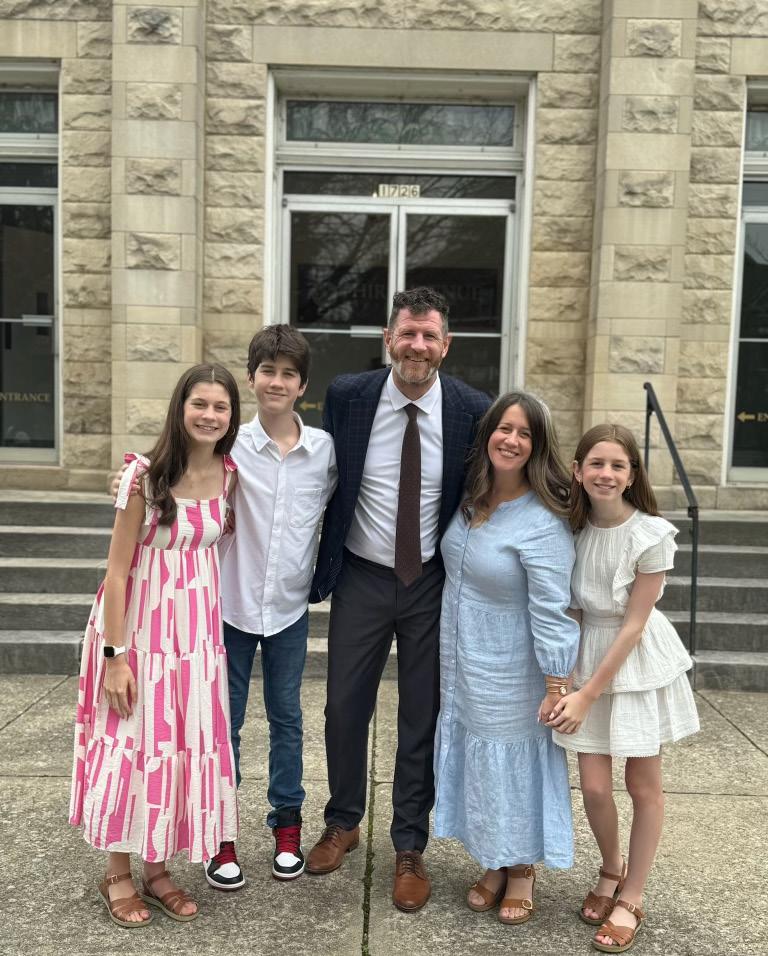
RYAN ROBERTSON President
Ryan Robertson serves as the President of Reaching & Teaching. Robertson has previously served in executive leadership positions for public companies and other non-profit organizations and has been a board member of several different charities. In 2014, he obtained his CPA from the State of Massachusetts. Robertson is currently enrolled in the Doctor of Missiology program at The Southern Baptist Theological Seminary. Ryan and his wife Erin have three children and are members of Third Avenue Baptist Church in Louisville, KY, where Ryan serves as an elder.
Rachel Ware: Director of Mobilization
When Reaching & Teaching Mobilizers have initial conversations with pastors or prospective missionaries, we always walk through our core convictions. The first thing we identify in those convictions is that we are Reformed. Admittedly, that term could refer to a number of different doctrinal positions.
What are we referring to when we say “reformed”? We have a rock-solid conviction that God is sovereign over all things (Daniel 4:34–35; Eph 1:11), including the salvation of his elect from every tribe, tongue, and nation (Eph 1:4–5; Rev 5:9–10). There’s no limit to what God can do (Jer 32:17). He will accomplish His purposes in His time for His glory (Ps 33:10–11).
Why does this matter for a missions organization? How does it shape our work at Reaching & Teaching? Here are four ways.
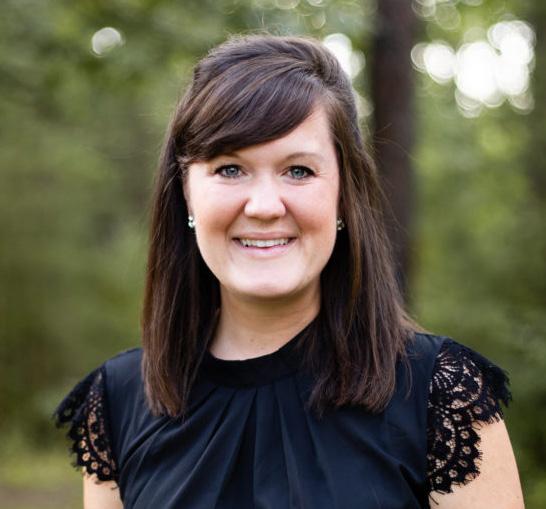
One definition of mobilizing (not ours!) is “to organize and encourage (people) to act in a concerted way in order to bring about a particular political objective.” Typical Mobilization efforts have tended toward convincing as many people as possible to be missionaries, using whatever emotional rhetoric they can think of to convince them to do so. Success depends on the amount of missionaries going rather than their character and competency.
But “Big God Theology” remembers that when Jesus commands his disciples to pray for the Lord of the Harvest to raise up laborers, it is his harvest. And his command is not to coerce and convince people to move overseas because of the need. His command is for us to pray. The mobilization team at Reaching & Teaching recognizes that God is sovereign over the desires and choices of his people and he will move whoever he wants to go wherever he wants. We also recognize the priority of the local church in cultivating, identifying, and assessing future missionaries. This doesn’t mean we are passive, but it does mean we are patient. The Lord
will raise up laborers for the harvest by answering the prayers of his saints and the direction given from local churches.
When one is truly convinced that there is nothing that we could do to raise ourself from the grip of sin and death and that only God could work that miracle in our hearts, it produces a humility that marks all of our interactions with the lost. Our missionaries’ Big-God Theology guards them from entering another culture with arrogance, thinking that they are in any way better.
There is pressure in any ministry to produce results that will impress. Every missionary who has ever written a newsletter update is familiar with this. But if that results-driven instinct is cultivated, a ministry can over time become more built on numbers and pleasing man than seeking to please God.
“Big God Theology” makes all the difference here. If we know that we’re unable to save anyone, we pray. When
Rachel Ware joined the staff of Reaching & Teaching in 2018 and loves connecting individuals who have a heart for discipleship and the local church with the countless needs around the world. She graduated from Union University in 2009 with a B.A. in Christian Studies, and served as the Director of Discipleship for women at Union for several years. In 2016, she received a Masters of Divinity from Southern Seminary and has had the privilege of serving in various overseas contexts in Asia, Africa and Latin America. She currently resides in Louisville, KY and is a member at Third Avenue Baptist Church.
we hear God’s command to preach the gospel to those who have not heard, we go. When we read Paul’s exhortation that it is not a matter of our coercive or clever speech, but only the power of the gospel of Jesus Christ, we don’t look for new, creative strategies. Instead, we rely on the ordinary means of grace that God has outlined in Scripture, trusting God to do the work that only He can do.
This also protects missionaries from misplaced guilt. While we must always be evaluating our faithfulness to what God has called us to, the measure of that faithfulness cannot be the fruit. We plant and water, but God alone gives the growth. So we evaluate our faithfulness based on our diligence in planting and watering, our commitment to represent Christ and the gospel accurately from Scripture as we depend on the Spirit.
Who’s to say what fruit the Lord may produce dozens of years after we are gone? He will do what he wills, and it’s not ultimately up to us. As Charles Spurgeon
says, “The sovereignty of God is the pillow upon which the child of God rests his head at night, giving perfect peace.” Our missionaries and staff alike rest their heads on the pillow of God’s sovereignty, knowing that God will bring about the fruit. We only have to be faithful.
I was recently at a conference where I kept hearing comments from the stage about “keeping the main thing the main thing” and “the most important thing.” In both cases, they were talking about evangelism.
I couldn’t help but think about how the churches I’ve been a part of have left me with a different mindset about this. To be clear, evangelism is very important, and most of us need more encouragement to be faithful to share the gospel, not less! But talking about evangelism as the main thing implies that the lostness of man is the main problem. True, sin is
man’s greatest problem on this earth, but there is something even more grievous: God is not being worshipped as he deserves.
This is the heartbeat of John Piper’s Let the Nations Be Glad. You’ve probably heard this quote, “Worship is ultimate, not missions, because God is ultimate, not man. When this age is over, and the countless millions of the redeemed fall on their faces before the throne of God, missions will be no more. It is a temporary necessity. But worship abides forever.”
It might seem strange for someone who works at a missions organization to write an article that states that evangelism is not the main thing and that missions is not eternal. But I do so because I have been reflecting on this: it’s precisely when our vision is filled with the beauty of God that we’ll be motivated by a desire to see his glory proclaimed in all the earth. Then we’ll be most faithful to the task that he has given us.
Our missionaries and staff alike rest their heads on the pillow of God’s sovereignty, knowing that God will bring about the fruit. We only have to be faithful. “
Alberto Puente:
Complementarianism is the belief that men and women, though equal in worth before God, have distinct roles within the family and the church. This concept finds its roots in the Genesis creation narrative, where God creates both man and woman in His image, affirming their equal value (Genesis 1:27). However, the roles given to them are different, reflecting God’s design.
In Genesis 2, further details reveal that Adam is created first and given the responsibility to work and keep the garden. Yet God sees that it is not good for man to be alone, so He created Eve from Adam’s flesh, establishing a complementary partnership. This partnership forms the foundation of marriage for both the first readers and all of humanity, where man and woman become one flesh. Genesis 1–2 establishes equal worth of man and woman, tells the story of the first marriage, and establishes their assigned roles in creation as a pattern and order that transcends time and culture.
Paul applies what we read in Genesis 1 and 2 to marriage. In Ephesians 5, he says marriage points to the greatest union of Christ and His church. The husband, representing Christ, is called to love his wife sacrificially as Christ loved the church. The wife, representing the church, is called to willingly submit to her imperfect, yet loving husband. This complementary relationship in marriage does not negate the equal worth of men
and women; it actually affirms the gospel. This understanding of marriage transcends cultural boundaries because marriage is a divinely ordained institution. All cultures somehow distort marriage. The Bible informs how the relationship between one man and one woman functions and the gospel transforms and empowers to actually redeem it. Therefore, complementarian marriage is relevant globally because it shapes how the gospel is demonstrated in various contexts.
Complementarianism is also applied to the church’s polity, where the creation order informs church leadership. In 1 Timothy 2–3, Paul emphasizes that qualified men, and not women or unqualified men, are to lead in the church because “Adam was formed first, then Eve.” This conviction guides the structure of church leadership, where, according to 1 Timothy 3, qualified men may serve as pastors, teaching the church in sound doctrine and modeling godly living.
This also transcends cultures. Even in monogamous cultures, the pastor is to be the husband of one wife. Even in egalitarian cultures, only qualified godly husbands and fathers that are able to teach are to pastor the church. This leadership once again reflects Christ’s own leadership over his household, the church.
Complementarianism has significant implications for missions. Our organization focuses on partnering with local churches that send global workers who embody complementarian
convictions. When sending men and women to fulfill the Great Commission, we want marriages and homes that reflect the gospel in a world where gender roles and family structures have been broken by the fall.
We also emphasize that global workers must train pastors who exemplify godly leadership both at home and in the church. This model of training and discipleship continues throughout the church as pastors identify both men and women who are able to disciple the rest of the church following the biblical pattern outlined in Titus 1 and 2.
The goal of missions is to plant churches that live in the “already, but not yet.” Missionaries are sent to plant churches that preview God’s original design in Eden (Genesis 1-2) and His plan for redemption in the new Eden (Revelation 21-22).
In the Garden of Eden, Adam and Eve lived in perfect union with each other and in communion with God. Although sin disrupted this harmony, Christ came to restore what was lost. Now we hope for the new creation where Christ’s bride will live in eternal harmony with the triune God. Redeemed marriages and the church is but the appetizer of the new creation.
As we engage in missions, our marriages and churches are called to proclaim and reflect this reality, showcasing to the world both the beauty of God’s design in marriage and the power of the gospel.
Assisting local churches in their mission to send qualified missionaries to the ends of the earth.
September 15-17





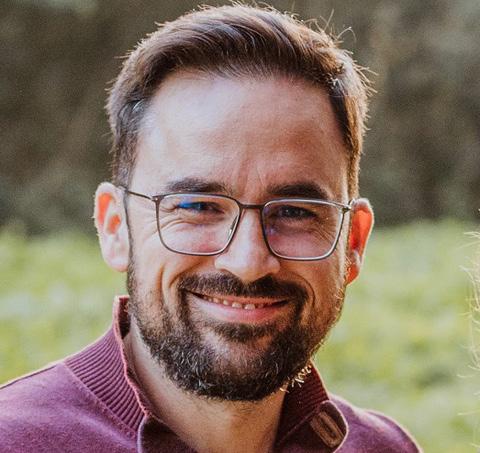
Global Worker | Spain
Alberto Puente is one of the pastors of Iglesia Bautista Fe de Sevilla in Spain. He was part of the team that planted this church in March 2012. He is married to Ashley and they have four children: Sergio, Ana, Santiago and Lydia.

“
The question “why Baptist?” matters in missions because it matters who holds the keys of the kingdom, who declares to the watching world who credibly belongs to Christ.
Global Worker: MENA F
Baptist churches can and should partner with other gospel-preaching churches in a lot of important ways–mercy ministry, for example.1 Pastors can and should pray publicly for gospel preaching churches in their city, even if they share different convictions on who is in charge of the church. And yet, in our missions and evangelism, it is crucial to state explicitly why being a Baptist matters to our work: God intends for the structure and make-up of the church to instruct the Christians who are in the church and those in the watching world.
The question “why Baptist?” matters in missions because it matters who holds the keys of the kingdom, who declares to the watching world who credibly belongs to Christ. Christ himself has profoundly linked his own reputation and glory with those who claim to be his own. Baptists today and throughout church history affirm that it is the congregation (gathered, baptized disciples) who has the authority to affirm credible gospel confessions and gospel living. In seeking to be self-consciously Baptist in our missions work, our aim is to make clear who Christ has given the authority to say who has credible claim to be his, making his name known to a watching world (Mt. 18:15–20, 2 Cor. 2:5–11).
Our identity as Baptists is also meant to be instructive to the members of the church. By seeking to plant gospelpreaching Baptist churches, we are
instructing converts, new and old, on their own God-given responsibility to guard and promote the gospel, which ought to be a means of helping them mature in the faith. When brothers and sisters joyfully and lovingly submit to each other and submit to their elders who have been entrusted to lead them, we are making a declaration that we think this is God’s design for us in the Christian life, how He would have us grow and mature (Eph. 4:11–16).
Finally, there are lots of good things missionaries can do, but the goal of all our effort is establishing healthy churches. Holding clear, unashamed, joyful convictions on our ecclesiology serves those to whom we are seeking to share the gospel.
Many errors have cropped up in missions because the final goal of missions has so often been forgotten. Some missionaries have considered their specific aspect of the work to be ultimate. But when viewed in light of the centrality of the local church, the missionary’s task is sharply focused: if our goal is a gospel-preaching, believing, and living church, in which disciples alone are baptized, then our marching orders naturally flow.
When Christians have sought to minimize ecclesiological convictions, the goal has usually been to not place any artificial barrier in front of those who may be converted. But we do a disservice to them if we pretend that these distinctions are trivial. While not being dismissive of different churches, we rather ought to affirm our convictions joyfully, humbly, and in love. It serves those to whom we
are sent when, for example, Baptists and Presbyterians love one another despite their important differences and yet do not seek to make light of their differing understandings of authority and identity in the church.
No one starts a road trip hoping they arrive at their final destination. They map out a route to accomplish it. Likewise, Baptist missionaries must work diligently with the clear-eyed goal of healthy Baptist churches because healthy churches made up of baptized believers led by qualified elders is God’s plan to make his name known to the world.
Jonathan Leeman, “A Congregational Approach to Catholicity: Independence and Interdependence Baptist Foundations” in Mark Dever and Jonathan Leeman eds., Baptist Foundations: Church Government for an Anti-Institutional Age (Nashville: B&H, 2015), pp. 367–380.
F serves on the faculty of Gulf Theological Seminary and comes from the USA. He completed a MDiv from Southern Seminary and a PhD from the University of St Andrews. He served previously as an elder at Hunsinger Lane Baptist Church, Louisville KY. He is married to L and they have two children. It is F’s great joy to help train and equip pastors and church members.
Laurens Pruis: Global Worker | Netherlands
At Reaching & Teaching we believe the local church is both the means and the goal of missions. Therefore, our missional focus is planting and cultivating healthy churches. This is what it looks like to “make disciples of all nations, baptizing them in the name of the Father and of the Son and of the Holy Spirit, teaching them to observe all that I have commanded you” (Matt. 28:19–20).
Making disciples, baptizing, teaching and discipling are all done in the context of a local church. Moreover, as healthy churches are planted all over the world, Jesus’ universal authority is manifested as people from every nation, tribe, and language acknowledge him as Lord (“All authority in heaven and on earth has been given to me” Matt. 28:18). And it is in and through healthy churches that Jesus’ personal presence is mediated, as he promised to be in the midst of local churches when they are gathered in his name (“behold, I am with you always, to the end of the age” Matt. 28:20; cf. Matt. 18:20). As

the book of Acts confirms, obedience to this Great Commission looks like planting and cultivating healthy local churches.
But there is a more fundamental reason why the local church should be front and center in our missionary efforts. We should be planting and cultivating healthy local churches in missions because this is what Jesus is doing in missions.
Let me explain. We should not forget that the Great Commission is really his mission. We get to join in. But we are mere instruments. So, before we should consider what we ought to do in missions, it might be helpful to consider what he promised to do in missions. Once we understand what Jesus is doing, it becomes much easier to understand what we ought to be doing.
Consider Matthew 16. After Peter, as leader and representative of the disciples, openly professes faith in Christ as the Son of the living God, Jesus promises that he will build his church “on this rock” (16:18). What Jesus reveals is that Peter—and the other disciples, with their rock-solid professions of faith in the Son of the
living God—will become the foundation of the church (cf. Eph. 2:20). This church (lit. “assembly”) refers to a people, assembled around and founded upon the words of Jesus Christ (cf. Matt. 7:24–27). And these words the disciplesturned-apostles would proclaim. And Jesus promises that, as they do this, he will personally build his church. It is his assembly, “and the gates of hell shall not prevail against it” (16:18).
What has Jesus promised he would do in missions? He promised to build a church. To gather his people into local congregations all over the world— founded upon the rock-solid foundation of the word of the gospel. This is his focus and priority in missions. So, if we want to join in, this should be our focus and priority.
But this is not all. Jesus not only builds his church, he also nurtures it towards health. Consider Ephesians 4. After Paul spoke of the church being built on the foundation of the apostles and the prophets (Eph. 2:20), he once again speaks of building, apostles, and prophets (vv. 11–12). He describes how Jesus, after his resurrection and ascension, provided his church some assistance. This assistance, says Paul,
Laurens Pruis is engaged in church planting in his home country of the Netherlands. After completing his M.Div. at the Southern Baptist Theological Seminary in 2023, he was sent out to plant a church in the city of Rotterdam. Besides hoping to see a healthy church planted and thriving in the second-largest city of the Netherlands, he is committed to raise up others to do the same all over the country and beyond.
comes in the form of church leaders: Christ gave apostles, prophets, evangelists, shepherds and teachers, “to equip the saints for the work of ministry, for building up the body of Christ.” Through their teaching and admonishing, these leaders equip the building of the church in order that it might grow. But they also protect the building against the collapse of false teaching (Eph. 4:12–16).
Jesus’ focus and priority in missions is not just to build a church, but to build a healthy church. Nurturing local congregations towards health through faithful leaders is part and parcel of Jesus’ missionary effort in the world. And so it should be for us. Building healthy churches is what Jesus is doing in missions. So building healthy churches should be what we are doing in missions.
We should simply get with the program. This is why at Reaching & Teaching we are focused on planting and cultivating healthy local churches. If this remains the focus of our missionary efforts, we may be sure that the gates of hell shall not prevail against it.
We should be planting and cultivating healthy local churches in missions because this is what Jesus is doing in missions. “


Whether you are considering long-term missions or want to mobilize your church, our Preview Day is a great place to start! What you can expect from the day:
Grow in a biblical understanding of missions
Discover RTIM’S DNA
Connect with like-minded Christians
Learn how you can partner with us


Time: 8am - 5pm
Price per Individual: $50


Austin, TX
Thursday, December 5, 2024
High Pointe Baptist Church
Celina, TX
Friday, December 6, 2024
The Trails Church
Louisville, Ky
Monday, December 9, 2024
rch
Immanuel Baptist Church
Portland, OR
Thursday, January 30, 2025
Hinson Baptist Church
Seattle, WA
Friday, January 31, 2025
Downtown Cornerstone Church
Raleigh, NC
Thursday, April 10, 2025
Christ Covenant Church


AJ Gibson: Regional LeaderLatin America and Sub-Saharan Africa
of peoples and places that warrant missionary labors: the misreached, the once-reached, and the underreached.
This article was first published at thegospelcoalition.org.
The apostle Paul was a pioneer missionary. His ambition was to preach the gospel where Christ hadn’t “already been named” (Rom. 15:20). A fire burned within him for those who’d never been told to “see,” for those who’d never heard to “understand” the message of God’s grace in Christ (Rom. 15:21). Although he spent much time laboring among churches, Paul always longed to move into “lands beyond” (2 Cor. 10:16).
But Paul understood not all gospel workers share his call. As he reminded the Corinthians, in God’s harvest some plant and others water (1 Cor. 3:5–9). In God’s building, some lay the foundation while others build on it (v. 10). These workers labor “as the Lord assigned to each” (v. 5). Some, like Paul in Corinth, are planters. Others, like Apollos, labor where the gospel has already taken root.
Today, in the world of missions, we tend to think of people groups in two categories: “reached” and “unreached.” But if, as Paul explained, some labor where others have sown, we can’t limit the church’s mission to pioneer work among the unreached. So where do waterers and builders serve? I want to suggest three additional categories
The “misreached” would include peoples and places where the gospel has arrived but in an impure form. Vast regions of the Global South fall into this category. There are countless professing Christians and churches in these areas, but many are the products of an anemic or false gospel.
Whether it be the result of Roman Catholicism, radical Pentecostalism, or some variety of the prosperity gospel, they’re Christian in name only. There may be an external form of Christianity that makes them look reached. They may even be labeled as “reached” and painted green on a map by wellmeaning researchers of people groups. But they’re not Christian and they don’t
have the gospel. They have a form of godliness, but the power of the gospel is absent (2 Tim. 3:5). Instead, they possess “a different gospel” which, Paul reminds us, is no gospel at all (Gal. 1:6–7).
The “once-reached” are people and places where there once was a faithful gospel presence but where, at some point in history, the candlestick was removed from its place (Rev. 2:5). It’s interesting that the Middle East, now among the most unreached regions on earth, was once the epicenter for the burgeoning early church. Europe, once considered the “ends of the earth,” later became the birthplace of the Reformation and eventually of the modern missions movement. Today, however, Europe is among the most secular, atheistic places on the planet.
As Paul reminded the Corinthians, in God’s harvest some plant and others water (1 Cor. 3:5–9). “
With the ebb and flow of the gospel throughout church history, many peoples and regions have moved back and forth between varying degrees of reached and unreached.
This reminds us of the complexity of our mission. We can’t view the Great Commission as a linear task to be fulfilled or finished. It’s a command to be perpetually obeyed. Boxes that were once checked become unchecked. Reached people often become oncereached.
We can’t view the Great Commission as a linear task to be fulfilled or finished. It’s a command to be perpetually obeyed.
Of course, the misreached and oncereached are in reality the unreached. They’re just not categorized that way by most missiologists. However, they’re just as needy. The lack of true believers in true churches rightly proclaiming God’s Word may leave the people in those places as unlikely to ever hear the true gospel in their lifetime as their counterparts in the 10/40 Window.
Many who are normally considered “reached” fall into the category of “underreached.” These are people and places that have the true gospel but lack the health to grow, make disciples, and fend off false teaching.
There are many reasons for the existence of the underreached. In some cases, the gospel has been introduced in seed form by a traveling minister, but it was never cultivated to maturity. Sometimes the gospel has come through a wellmeaning but misguided missionary who
was eager to “finish the task” of world evangelism but didn’t stay and “finish the mission” of discipling converts and establishing churches. In other cases, people are underreached because local leaders were never identified or fully trained to shepherd the flock and rightly handle the Word (2 Tim. 2:2, 15).
At some point in the life of these “reached” peoples, the process of fully obeying the Great Commission through faithful, full-orbed church planting was cut short. They were never brought to full ecclesial health. As a result, existing churches are unhealthy at best or dying at worst.
In underreached areas, there’s often a constant threat from false teaching because no one was taught to “give instruction in sound doctrine and also to rebuke those who contradict it” (Titus 1:9). As a result, they’re “children, tossed to and fro by the waves and carried about by every wind of doctrine” (Eph. 4:14). Sometimes sin is rampant because the church was never taught to biblically address it.
What do all these peoples and places need? They need Great Commission workers. In some cases, they need planters and foundation layers; in others, they need waterers and builders.
What do all these peoples and places need? They need Great Commission workers.
Given the realities of the misreached, once-reached, and underreached, I believe we should move beyond “unreached” and “reached” as the only labels for the peoples of the world. In
missions, we need a more nuanced understanding of the diverse places where the gospel has gone. And we need a greater appreciation for the variety of missionaries needed for the task.
These laborers, Paul insisted to the Corinthians, shouldn’t be in competition. They are “God’s fellow workers” (1 Cor. 3:9). Each one is given a specific role and function. At the end of the day, “he who plants and he who waters are one” (v. 8). They’re essentially the same. They’re simply servants in God’s harvest, each one working in the field God assigns.
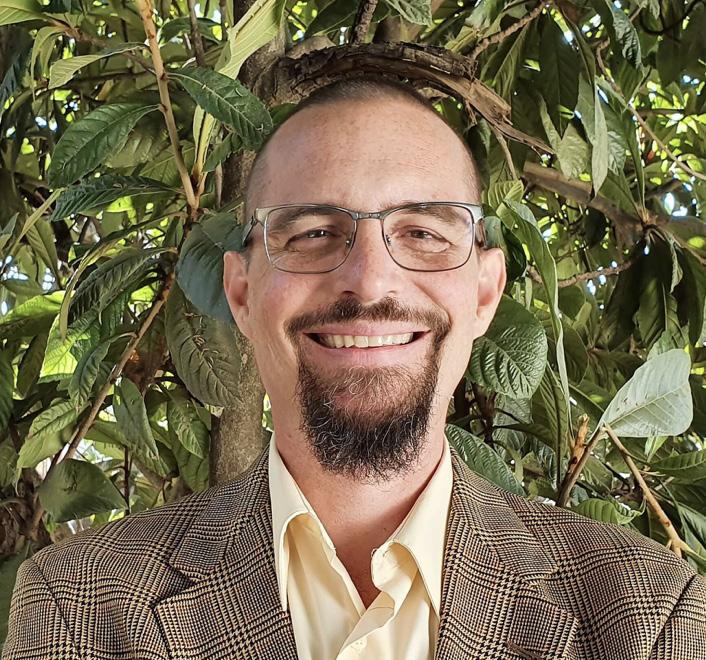
AJ joined Reaching and Teaching in early 2015 and AJ serves as Reaching and Teaching’s Regional Leader for Latin America and Sub-Saharan Africa. He also travels and teaches throughout Mexico and South America. The Gibsons now live in south Texas and AJ serves as an elder in his local church.
Matt Bennett: Director of Long-Term Ministry
At RTIM, we are adamant about the importance of our workers having theological and methodological alignment. We want to assure sending churches that when their missionaries get there, they will be working with people who share their theological convictions and are already committed to churchcentered missions.
We often define this philosophy as an upside-down funnel. People come into RTIM through the narrow top of the funnel, but their churches send them to do a broad array of aspects of the missionary task.
There are RTIM global workers who have been sent by their churches to serve within already-maturing ministries like pastoral training and theological education for raising up national leaders. At the same time, there are other RTIM global workers whose churches have sent them to proclaim the gospel and make disciples for the first time in jungles, islands, and mountains.
With that said, we recognize that these different jobs require different trainings. Which is why we love to work with specialized organizations like Radius and Radical. We love to link arms with people in their area of expertise. For those who
are heading to unreached language groups, we learn on Radical and Radius to provide RTIM workers with at least three points of unique preparation: culture and language acquisition (CLA), business for mission (BFM), and Bible translation.
Language learning is one of the first aspects of missionary life. Even if you find yourself working among a people who speak an “easy” language, there is nothing “easy” about this stage. Nonetheless, Radical and Radius use tools for language learning that have a proven track record of success. Those who have gone through this training tend to exhibit deep fluency more quickly.
But learning the language is only part of the process. It’s a portal into and carrier of a people’s culture. The training programs offered at places like Radius and Radical intentionally weave language acquisition with cultural observation. They don’t want to reproduce mere speakers of a new language; they want to form true communicators. These skills are vital to thriving gospel ministry, especially in pioneer settings.
In addition to training for CLA, both training programs recognize the need for creative access to many of the hardest-to-reach peoples and unreached language groups. During these programs, business experts help students develop business plans that
provide legitimate and sustainable access among pioneer peoples.
Some common approaches to creative access emphasize the business or access point and squeeze out the margin for ministry. Others propose hollow businesses that are readily perceived by locals as a sham. Neither of these options are healthy or helpful. Instead of embracing these poor approaches, Radius and Radical prepare students for doing business that will provide legitimate access, meaningful identity, and natural access to ministry.
Finally, in many of the pioneer places that RTIM workers might target, the spoken language hasn’t yet been translated to writing. Neither has the Bible been translated. Neither Radius nor Radical are equipped to provide the necessary theological training or the biblical languages that will prepare a student for this profound task. But for those students who come to Radius or Radical after having theologically prepared elsewhere, they leave better prepared to engage the task of reducing an oral language to written form and then getting to work on translating the Scriptures.
For all of these reasons and more, we are grateful for the chance to link arms with training programs like Radius and Radical. The training and expertise these programs provide are a huge blessing and benefit to those being trained up to be sent out, especially to pioneer settings.
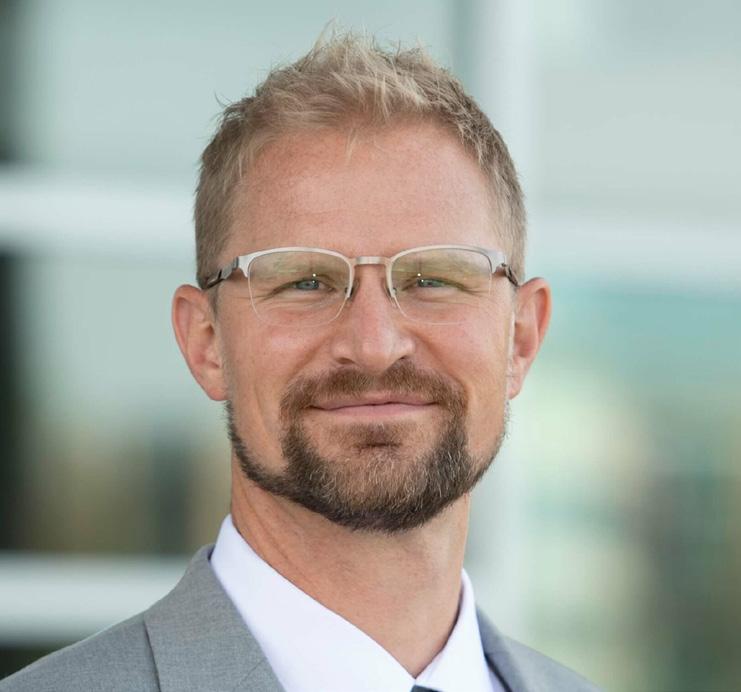
Director of Long-Term Ministry
Matt serves as an Associate Professor of Missions and Theology at Cedarville University, and also as the Director of Long-term Ministry at RTIM. He obtained his Ph.D. in Missiology from Southeastern Baptist Theological Seminary and served for six years in North Africa with the International Mission Board. He is the author of Hope for American Evangelicals: A Missionary Perspective on Restoring Our Broken House(B&H, 2023), The Qur’an and the Christian: An In-Depth Look into the Book of Islam for Followers of Jesus (Kregel Academic, 2022), and 40 Questions About Islam (Kregel Academic, 2020). He has written articles for 9Marks and The Gospel Coalition among other publications. Matt and his wife, Emily, live in Cedarville, Ohio with their three children Anabelle, Elliot, and Oliver. They are members of Grace Baptist Church, where Matt serves as an elder.




Matt Tyler: Global Worker | Thailand
No matter the time of day, the roar of traffic rises to the floors on even the tallest towers. Whether 1 PM or 1 AM, people are out. Every morning—wherever you are in the city—the smell of incense sits heavy in the air. It’s chaotic. It’s hot. It’s Bangkok—and it is a great place to pastor.
With 15 million people, Bangkok is one of Asia’s largest cities. It’s overwhelmingly Buddhist. Most Christian work is done among the hilltribes to the North. As far as I can tell, it’s also where we can see the most visible fruit.
Still, Christians have had a presence in this city for nearly 200 years. Bangkok is often the first stop for missionaries who desire to proclaim the gospel in Thailand. When my own family moved here in 2022 with the prayerful hope that we might plant a church in the heart of the city, we had two words in mind: learning and charity. We wanted to get to know the Christians and
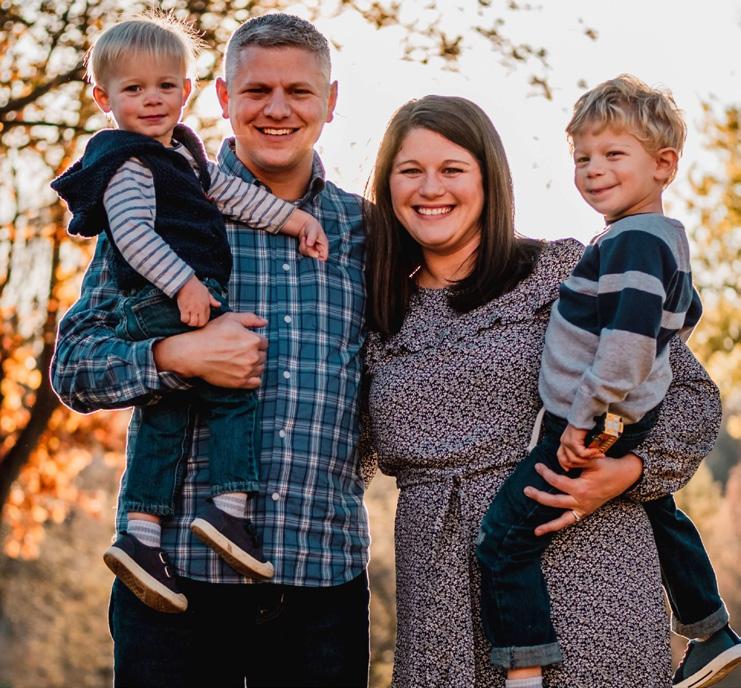
missionaries who have called Thailand home long before we even thought about moving here. We wanted to learn from them. We were committed to a charitable disposition toward any brother and sister in Christ.
At the same time, we came with clear convictions that we weren’t ashamed of: we’re Baptist, reformed, and complementarian. These convictions fit with our approach to learn from and extend charity toward fellow Christians. We believe the Bible teaches these doctrines, and we therefore don’t want to water down Scripture by ignoring them. At the same time, the Scriptures exhort us to love those who have true faith in the true Jesus.
Our commitment to love and charity has given us a good reputation throughout the country—even from those who may disagree with our convictions. It’s allowed us greater insight into the country we call home. It also puts us in a position to influence others toward biblical doctrine and faithful practice.
Because Bangkok is a hub for so many industries, we regularly interact with
professionals, backpackers, students, and teachers from all over the world— both Christians and not. Many speak English, some do not. Missionaries from all over the globe pass through Bangkok for conferences, healthcare, visa issues, and vacations. And, of course, Bangkok is a travel destination to Thais of all backgrounds.
Each of these groups are represented at Bangkok City Baptist Church on any given Sunday morning. Every week, a missionary from another country will come up to me and explain how refreshed they were by being with us. Often, they’re coming to us from places without a church. We always have a handful who stay with us for a few months of rest after a trying season of ministry. Some reach out to me later seeking counsel about their own ministries. Our city church loves that we get to serve the global church this way!
Every Sunday, our church also has several unbelievers—both Thai and others. Our members work hard to interact with them with the goal of sharing the gospel. In the last few months, we’ve been able to go through Christianity
Matt and Emily and their two sons, Samuel and Calvin moved to Bangkok, Thailand to begin a new work with the goal to plant a healthy church in the city. Matt and Emily have been married since 2011 when they first moved to Lousville, KY for Matt to pursue his Masters of Divinity at Southern Seminary. It was there that they joined Third Avenue Baptist Church and upon graduation were sent to East Asia to join 3ABC supported workers there. They have lived in East Asia since 2015 where Matt became an elder in their church and their two sons were born. Due to the pandemic, they were displaced in America for a year and a half, but it was during this time that God opened the door for them to transition to Bangkok with RTIM.
Explained with people from Thailand, India, Malaysia, Poland, Taiwan, and Myanmar. Our city church loves getting to serve the global community this way!
City life also affords our church greater access to resources that we can share with the rest of Thailand. Thai churches have a great need for biblical resources: books, videos, online articles, and trainings. As an international hub, Bangkok gives us the opportunity to easily connect with
global partners who want to help with Thailand’s “theological famine.” We also have greater access to translators and printers. Since Bangkok is also the pathway into the rest of the country, we can then send these resources throughout the country or easily bring church leaders to Bangkok for training. Our city church loves getting to serve Thai Christians this way!
Of course, we don’t know how the Lord will choose to use these efforts. We
do know that cities provide strategic and unique opportunities for both multicultural ministry and specific people groups. We believe that a global city church (even a very small one) profoundly committed to the authority of God’s Word—both the doctrinal convictions and the practical dispositions—allows us to serve a multitude of people created in God’s image. By his grace and for his glory!

Jason Wright: Global Worker | Argentina
With the number of misreached, unreached, and underreached peoples in the world today, one may wonder why any missions agency would prioritize theological education. Here’s one reason why: the Great Commission cannot be fully obeyed if we don’t take seriously the need to prepare the next generation of pastors and leaders with sound theological training.
Let’s first consider the biblical data. The Great Commission itself implies local churches where discipleship and baptism take place. Teaching disciples to obey all that Christ commanded is theological education. Of course, much of this teaching will take place informally, but as a church matures, more formal training becomes necessary.
We see this formality and intentionality take shape as the New Testament advances. In Acts, Paul and his companions strengthen, encourage, and appoint elders for each new church (Acts 14:22–23). The pattern of leadership training that Paul commends to Timothy is to take what he has learned from Paul and “entrust to faithful men, who will be able to teach others also” (2 Tim 2:2). This verse suggests intentionality in the who (faithful men who are able to teach) and the what (the teaching received from Paul). In giving the standard for pastoral leadership, Paul writes that an elder “must hold firm to the trustworthy word as taught, so that he may be able to give instruction in sound doctrine and also
to rebuke those who contradict it” (Titus 1:9). Again, there is intentionality both in who the candidates are and what they must be taught. Paul’s use of the phrase “sound doctrine” here and in Timothy, suggests that there is a set theology that is formalized and taught from generation to generation.
The dangers of rejecting theological education as part of the missionary task are many. Without theological training, false teachings about hell, conversion, and the exclusivity of Christ are easily accepted and the church ceases to evangelize. Without theological training, private interpretations of Scripture are accepted no matter how out of context they are. As a result, the word of God is manipulated. Without theological training, errors that believers throughout history have confronted and corrected are repeated and the gospel is lost. Without theological education, error enters the church and she ceases to be a lighthouse of truth. Sadly, missions history is full of examples where this has occurred.
In the jungles of the Amazon, this can be seen in a “church” where songs are sung and Bible verses are read, but afterward, chickens are sacrificed to other deities to ensure a good crop yield. In Japan, this can be seen in a “church” where God is worshipped alongside ancestors. In both cases, believers and even pastors have little to no theological training to evaluate whether these practices accord with sound doctrine or not. There may be churches, but they are far from healthy. I think often about my friend Fabian who several years ago planted a church in a very remote and spiritually difficult
village. There is no other gospel witness in his village or for hundreds of miles in several directions. What is taught as the gospel and sound theology in his church will be the only thing that people know about Christianity for the next several generations. If he cannot “give instruction in sound doctrine” or is unable to “rebuke those who contradict it,” his church will damage the name of Christ in that village for years to come. Thankfully, Fabian received and continues to pursue theological education. His church is a lighthouse of the gospel and biblical teaching amid spiritual darkness.
We can take the need for theological education one step further as we consider the missionary sending possibility of places like Latin America and Sub-Saharan Africa. These regions have traditionally been places where missionaries were sent. However, as the church in those places continues to grow and mature, it’s incredible to consider the missionary sending potential. Healthy missions require healthy sending churches. For these new missionaries to be effective in planting churches in lesser-reached parts of the world, they will need to be theologically trained to “contend for the faith that was once for all delivered to the saints” (Jude 3).
Whether we are going or sending, we cannot get around the need for theological education.
We must invest in the slow task of training local leaders in sound theology so that they can continue to make deep disciples and establish healthy churches around the world.
“
…the Great Commission cannot be fully obeyed if we don’t take seriously the need to prepare the next generation of pastors and leaders with sound theological training.”

Jason and Kami Wright deployed in the fall of 2016 to provide theological training and leadership development in Córdoba, Argentina. The Wrights have three children: Kayden, Carley, and Brielle. Jason served on the stateside staff of Reaching & Teaching prior to being sent into the mission field. The Wrights are sent out by Redeemer Church in Abilene, Texas. Jason and Kami desire to see pastors and church planters “grow in the grace and knowledge of our Lord and Savior Jesus Christ” (2 Peter 3:18) so that churches can be strengthened and God glorified.

Your financial support ensures Reaching & Teaching is equipped to make mature disciples, establish healthy churches, and train local leaders around the world.
As RTIM grows, your partnership in the gospel provides strategic care and resources for our team of global workers and global training efforts for the years ahead. Supporting the work of


Reaching & Teaching is excited to partner with 9Marks on the production of Missions Talk. Missions Talk is a regular conversation about biblical and practical elements of missiology.
Subscribe to Missions Talk wherever you listen to podcasts.
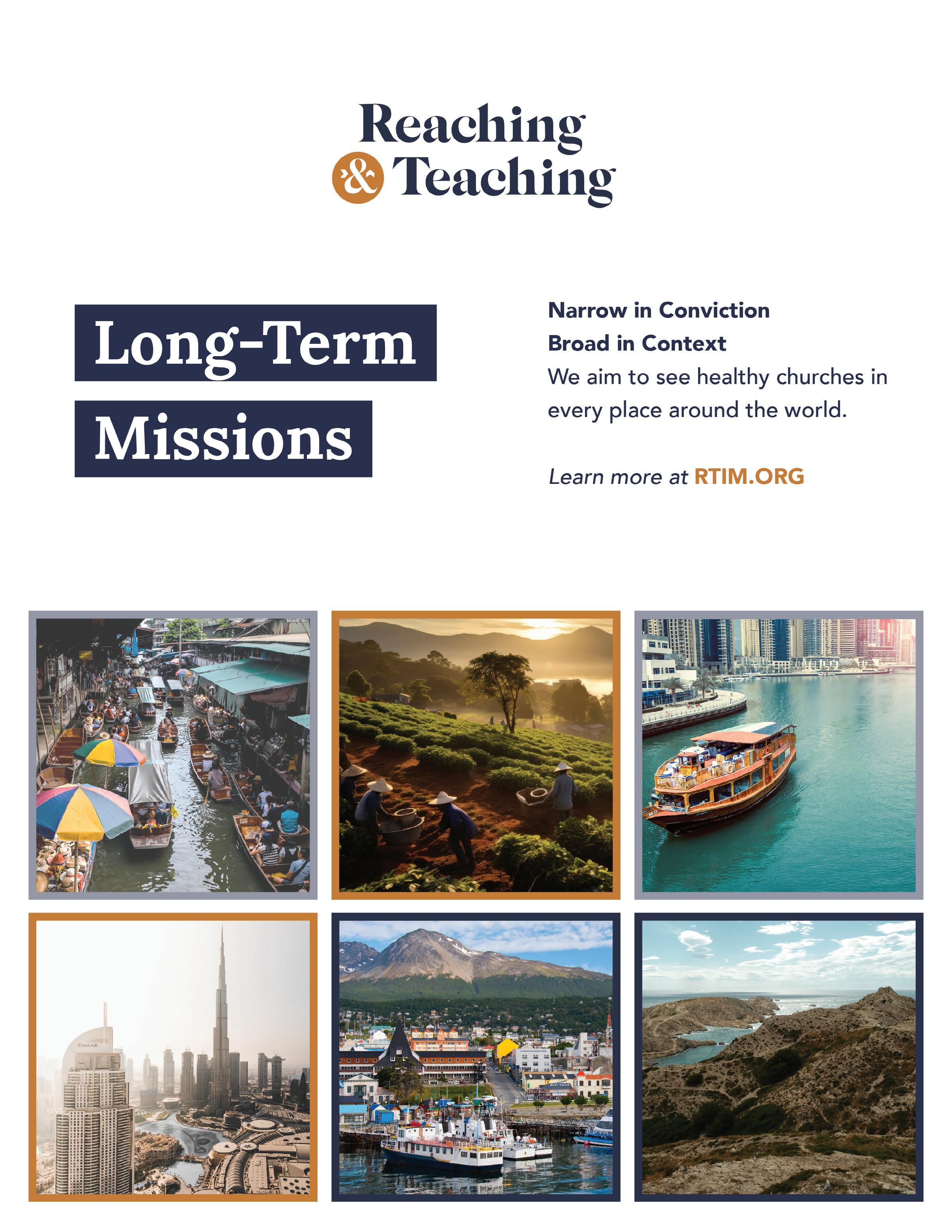
Matt Bennett: Director of Long-Term Ministry
Missions is a complex undertaking. Reaching & Teaching has sought to clarify the three core tasks of missions as making mature disciples, establishing healthy churches, and training local leaders. But even with that clarity, the state of the church—or lack of a church—in a particular location will have an effect on how an RTIM worker goes about working these core tasks out.
In this edition, you will read about work in Central Asia and Sub-Saharan Africa. These two regions represent very different challenges and approaches to these core tasks.
For example, most of the Central Asia region is gospel-hostile due to either Islamic influences or post-soviet culture. While Christian communities and churches have been sprinkled throughout this region for a long time, very few are healthy, and many are unorthodox. Along with that, there are innumerable human needs in the region. Our Regional Leader for Central Asia provides a glimpse into what he is seeing as the church-centered missions approach to taking those needs seriously, but meeting them eternally.
On the other hand, AJ Gibson, Regional Leader for Sub-Saharan Africa, gives us
a glimpse of some of the different needs that his region of often “misreached” or “underreached” communities exhibit. While Sub-Saharan Africa purports to be nearly 60% Christian, the needs for healthy churches and for well-trained pastors are great as the prosperity gospel and syncretism remains prevalent.
Despite the difficulties and differences these regions report, both Regional Leaders write hope-filled reports about what the Lord is doing to equip his church to be the pillar and buttress of the truth in all contexts. Read on and be edified!

Central Asia is a vast region of the world with incredible needs for gospel ministry. Most Central Asians are Muslims, and many have never heard the gospel. When you live in the region and consider the “lostness” all around you, it can be overwhelming. In fact, surrounded by so many needs, missionaries can feel pulled in a million directions. So how do you determine what to prioritize?
This is one area where RTIM’s churchcentered approach can be so helpful. By focusing on the local church, global workers can avoid spreading themselves too thin with all sorts of projects and partnerships. Instead of chasing every ministry opportunity—or feeling like a failure for not doing more—they can live within their limits and have realistic expectations for what’s required of their work. In this way, the local church is a grounding presence in the missionary’s life.
But focusing on the local church shouldn’t limit our effectiveness. Instead, it should actually increase fruitfulness. The local church can function as a source for gospel partnership and a hub for ministry opportunity. Missionaries who invest in the local church will often see a positive ripple effect moving out from that ecclesial epicenter into other relationships and ministries. Thus, the local church has an expanding influence on the missionary’s work.
What does it look like for a churchcentered approach to ground a missionary’s life and expand his work? Let me give two quick examples from Central Asia.
In a large city in our region, an RTIM global worker has full-time secular
employment. His job enables him to gain long-term residency in a country that’s otherwise “closed” to missionaries. However, because of his work, he’s not able to invest as much time as he’d like in direct ministry. In this case, a church-centered approach helps him know where to focus his limited time—in the local church. And that focus simultaneously increases his capacity for outreach.
As he’s built relationships with unbelieving coworkers and had evangelistic conversations with them, he’s been able to invite them to church. Meanwhile, through the relationships he’s formed at his church, he knows other believers who host English clubs in his city. He then can connect some of his local friends with those clubs, which provides further exposure to the gospel. His commitment to the local church has expanded his ministry potential.
In another Central Asian city—one that’s even larger—an RTIM global worker is pastoring an English-speaking international church. Surrounded by millions of unbelievers, he and his wife could easily be overwhelmed with opportunities and needs for ministry. But by focusing on their congregation, they have realistic parameters for what they can accomplish. And God is doing some amazing things through their relatively small congregation.
The women of the church host a vibrant refugee ministry in their building, providing numerous opportunities for evangelism to those in need. Although it’s an English-language church, it also has Iranian, Turkish, and Chinese fellowships that meet regularly and are involved in local outreach in various languages. The church hosts a VBS in the summer for the community. And since the church serves many expats, this RTIM couple can invest in other missionaries by encouraging, counseling, and shepherding them toward fruitful ministry.
Across Central Asia, RTIM has global workers involved in a variety of efforts: publishing Christian literature, training local pastors, evangelizing college campuses, and reaching minority language groups with the gospel. In each case, investing in a healthy local church provides the centerpiece of their strategy, laying a solid foundation for a growing ministry influence.
B and his wife K served for seven years as missionaries in Central Asia, working in evangelism, discipleship, and church planting. After returning to the US, B spent six years as a global trainer, traveling around the world to equip international church leaders for ministry. He desires to see the gospel spread and churches established among the nations of Central Asia. B is a graduate of The Southern Baptist Theological Seminary. He and K have three children.
Learn more about Long-term opportunities by connecting with a Mobilizer at rtim.org.
AJ Gibson: Regional LeaderLatin America and Sub-Saharan Africa
Despite its long history with Christianity, Sub-Saharan Africa is a spiritually needy region. Although 60 percent of its population identify as Christian, and although churches abound, much of what happens in the name of Christ and Christianity is far from healthy.
In that regard, Sub-Saharan Africa bears many similarities to Latin America. Both regions were heavily colonialized by the west. Both have suffered from economic and cultural struggles as a result of that colonial history. Both regions have tended to suffer from political instability, and there are many similarities in the way governments function. Both regions have large, highly developed urban populations as well as many very remote tribal areas.
Religiously, Latin America and SubSaharan share a history of animism that has tended to integrate and syncretize with the religion of their colonizers and with other religious imports. There are also many similarities in the progress of the gospel and the state of the evangelical church in both regions. This, of course, varies by country, but in general we see pockets of ecclesial health and at the same time widespread unhealth. From a 30,000 foot perspective these areas often appear as fully reached with the gospel. But when one gets down in the weeds, he finds that things are not what they first appear.
To use common RTIM parlance, much of Sub-Saharan Africa is “misreached” and “underreached.”
And yet, despite these challenges, there are many reasons to be encouraged. Reaching & Teaching has a small footprint in Sub-Saharan Africa, and I’m especially encouraged by a couple of developments.
Church health is only possible where there are qualified, trained, and reproducing local leaders.
The first is seeing national workers return to do gospel work in their home country. We would love to see God raise up an army of national workers who have come to the US to study and prepare for ministry to return to their home country. The reason for that is simple: nationals usually are much better suited to bring the gospel and make disciples. This is especially true in the areas of church planting and revitalization. Nationals simply don’t face a lot of the cultural and linguistic challenges that expat missionaries face. They get the culture instinctively—both the broader culture and the church culture.
So I’ve been very encouraged that we have several new workers from Africa who are returning to their home country to do gospel work.
The second encouraging development is the inroads Reaching & Teaching has made in pastoral training. It would be hard to exaggerate the need for solid ministerial training in Sub-Saharan Africa. Church health is only possible where there are qualified, trained, and reproducing local leaders. Untrained pastors have had a devastating impact on the region.
Reaching & Teaching’s Josh Rattin reports the following observations from Paul, a pastor he works with in Uganda:
When you look at the number of churches, most of them are being pastored by people who just know how to read the scripture, but actually they can’t interpret scripture. They can’t really apply scripture biblically and that is why all of these false teachings are so rampant. For example, the pastor in the village just reads the scripture and begins to say
whatever he wants to say because, what else does he know? And so I think the role of missionaries should be to really come and work with the leaders and influence the leaders and train and disciple leaders so that they are able to disciple their own people and their own people are able to be sent out to go and plant healthy churches. We are a spiritual country, but we are in a spiritual crisis.
Last year I had the opportunity to meet Paul. In one of our conversations, he told me that when they do pastoral training, their first task is to make sure that the pastors are actually born again. Often men are thrust into the pastorate because they’re the only ones who know how to read or because they happened to be the first convert in their village—not because they’re gifted or qualified.
Because of this, I’m very encouraged by the work being done by RTIM long-term missionaries and by our Global Training team.
Other than the gospel and Jesus himself, the greatest need in Africa is for healthy local churches. Africa needs Bible-preaching-and-practicing churches led by gifted, qualified, well-trained, reproducing leaders. May Christ build his church!
Regional Leader: Latin America and Sub-Saharan Africa
AJ joined Reaching and Teaching in early 2015 and AJ serves as Reaching and Teaching’s Regional Leader for Latin America and Sub-Saharan Africa. He also travels and teaches throughout Mexico and South America. The Gibsons now live in south Texas and AJ serves as an elder in his local church.
